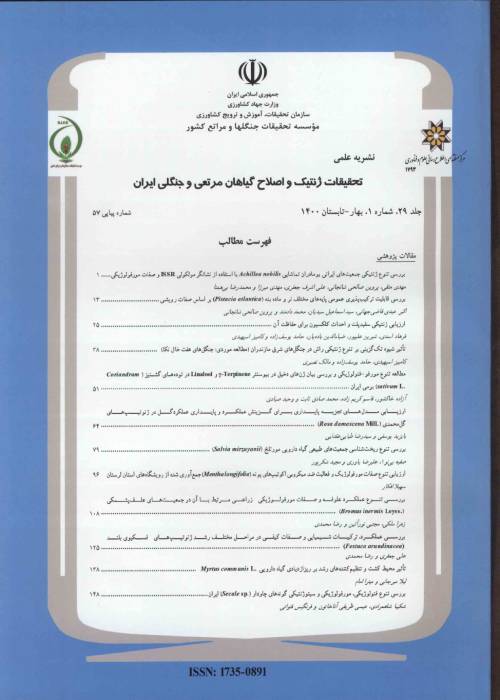Effect of silicone on yield components, some morphophysiological and phytochemical properties of Hyssopus officinalis under irrigation regimes
Water shortage is one of the most important environmental factors that may reduce the growth and yield of many agricultural crops. Silicon, as the second most abundant element in the earth's crust, plays a vital role in resisting biotic and abiotic stresses in plants. Considering the increasing problems of water scarcity in Iran and the need to know about drought tolerant plants and the treatments to help increase this tolerance, this research aimed to study the effect of silicon on yield, morpho-physiological, and phytochemical characteristics of hyssop (Hyssopus officinalis) under irrigation regimes in a pot experiment in the Gorgan University of Agricultural Sciences and Natural Resources, Gorgan, Iran.
A factorial experiment was conducted in a randomized complete block design with three replications (each replication included two pots). Drought stress levels included: [(D1) 100% field capacity (FC), (D2) 75% FC, (D3) 50% FC, and (D4) 25% FC)] during three months. Different silicon levels of [(S1) zero (control), (S2) 0.75, (S3) 1.5, and (S4) 2.25 mg/liter] were also sprayed four times, once every three weeks. At full flowering stage, the tested traits including root and shoot length, fresh and dry weight of root and shoot, leaf area, chlorophyll and carotenoid content, total phenol, total flavonoid, antioxidant activity, percentage of essential oil were evaluated.
The results showed that different irrigation regimes had a significant effect on all the measured traits except aerial weight and internode length. So, drought stress decreased the fresh and dry weight of the root, the leaf area, and the number of branches. Whereas, drought stress increased the amount of total phenol and the percentage of essential oil. Also, the silicon effects were significant on all the measured traits except the number of flowers. Increasing the silicon concentration caused an increase in the plant leaf area and the essential oil percentage.
Increasing the concentration of silicon in foliar spraying caused an increase in the yield components of the hyssop plant under water stress conditions. At the same time, this treatment was able to increase the production of plant secondary metabolites, including total phenolic compounds, flavonoids, essential oil percentage, and as a result, increase the percentage of free radical inhibition. These results indicate the improving effects of silicon on hyssop performance as a medicinal plant under drought stress conditions. According to the result, the concentration of silicon was 1.5 mg/liter was most effective.
- حق عضویت دریافتی صرف حمایت از نشریات عضو و نگهداری، تکمیل و توسعه مگیران میشود.
- پرداخت حق اشتراک و دانلود مقالات اجازه بازنشر آن در سایر رسانههای چاپی و دیجیتال را به کاربر نمیدهد.



